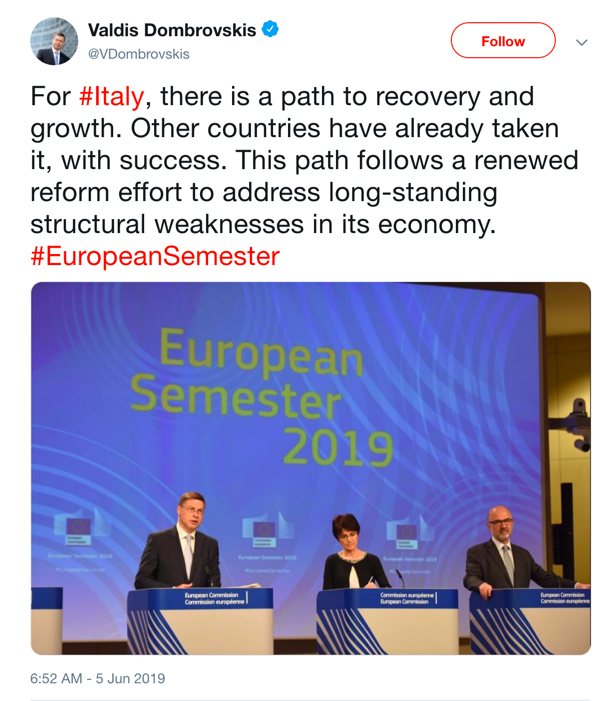Geopolitical confrontation and the breakdown of globalization
Everything I am reading this morning in the news flow points to increased geopolitical confrontation and the breakdown of the post-Cold War world order. We are quickly moving to a more hostile balkanized geopolitical environment. And I believe this will negatively impact medium-term growth, with global recession risk rising as a result. Stories and my thoughts below
Let’s start with China. The FT has had a bevy of articles regarding the deteriorating relationship with the US.
News of China’s ‘unreliables list’ spooks foreign business
This FT article from yesterday reads as follows:
The “panicked” phone calls from clients started to come in within hours of the Chinese commerce ministry’s announcement on May 31 that it would compile a list of “unreliable” companies and individuals, according to one person who advises foreign groups operating in the country.
Just a month ago, multinationals and investors were looking forward to an agreement that would end the China-US trade war that has rocked global markets for the past year. Instead, talks broke down as Washington and Beijing accused each other of “reneging” on the terms of an evolving agreement, shortly after which US president Donald Trump further enraged Chinese officials by barring Huawei, the country’s best known telecoms company, from sourcing American components and technology.
[…]
“The unreliables list gives China another card to play” in its ongoing trade and technology battles with the US, Yifan Hu, chief China economist for UBS’s Asia wealth management arm, said at a conference on Tuesday.
[…]
The list, the Global Times said, “will carry weight and include well-known US companies that are strong enough to ‘pose actual or potential threats to China’s national security’.” It added that the list would be “a starting point [for Beijing] if Washington tries to weaponise US technology power to contain China’s rise”.
This is the most important breakdown in global economic cooperation. We’ve been here before, just after the financial crisis a decade ago. Back then, I wrote a whole article about Murder-Suicide in Chimerica. And my conclusion then was that the economic marriage between the US and China was ending. And the only question was whether “it will end gradually and peacefully in divorce or violently in murder-suicide”.
Under Obama, US and Chinese policymakers opted for divorce, slowly unraveling the interdependency without risking out and out confrontation. In my view, this was largely driven by the Obama Administration’s policy decisions, with China reacting in kind. But the Trump Administration is much more confrontational. And what the article above shows clearly is that the Chinese will respond in kind just as they did with Obama.
Now, the article talks about Google as a potential addition to the ‘unreliables list’. Others talk about Apple as the likely target of a Huawei retaliation. I would speculatively add Tesla to that list — first, because Tesla has been weakened and, secondly, because Tesla is dependent on the Chinese market for volume growth.
However, you look at it though, we are now in a period of confrontation. And investors and business executives have now been disabused of the notion that detente is just around the corner. It’s not.
Political confrontation between the US and China
This isn’t just an economic issue, with the US and China vying for global economic leadership. Martin Wolf gave voice to that aspect of the dustup yesterday. He calls it “the looming 100-year US-China conflict“. And he pins most of the blame on policy hawks in the US who have been looking for an adversary to justify aggressive geopolitical moves since the collapse of the Soviet Union. I think it’s worth a read for a sense of Washington’s role in fomenting this discord.
But, I am less interested in assigning blame than in thinking about outcomes. And for me, the outcomes are all-encompassing, not just economic but also political. For example, look at the FT’s piece yesterday on China warning its citizens on visiting the US.
“Recently, US law enforcement agencies have repeatedly harassed Chinese nationals travelling to the US through border interrogations, drop-in visits and various other means,” wrote China’s Ministry of Foreign Affairs on its official social media feed on Tuesday.
The same day, the Ministry of Culture and Tourism issued a travel warning that “recently, gun shootings, robberies and thefts have occurred frequently in the United States”, according to state media.
The Chinese can achieve multiple aims with these statements. First, they are a warning to the US that the Chinese are creating a pretext for retaliation on the political front – meaning that US citizens in China are not safe from arbitrary detention. Second, these statements can act as propaganda in China for a population which is increasingly hostile toward the US given the global confrontation led by Trump. This is not the Tiamnnamen generation that saw the US as a beacon on the hill. The view of the US inside China has worsened considerably. And that favours a hardline approach to confrontation with Trump.
The splintering of Europe
Of course, let’s remember that it’s not just about the US here. We see the same forces in effect in Europe. Let me remind you that when you see the same kind of geopolitical trend popping up in multiple places, you have to discount any narrative that relies exclusively on narrow idiosyncratic internal considerations as the genesis of the problem. The wave of nationalism sweeping the globe right now points to a systemic issue with how globalization has been adjudicated.
And when I use the term ‘globalization’, I am not thinking in narrow terms but in terms of identifiable socioeconomic groups feeling aggrieved about ceding control to ‘outside forces’. In the EU, we can see that with the European Commission’s confrontation with Italy.
These tweets this morning from Valdis Dombrovskis, the former Prime Minister of Latvia and current EC Vice President, serve as an example of how this is playing out.
First, he praises Spain for a job well done on fiscal policy.

Then he disparages Italy for breaking the rules and lectures them on how to get things done (as Latvia did after the financial crisis a decade ago).

What Dombrovskis is pointing out is what the Guardian writes that
“Italy has not complied with Europe’s debt rules. That’s because its deficit is forecast to hit 2.5% of GDP this year, over the target of 2%.”
And so, monetary sanctions – penalties – will be applied to Italy for breaking the rules. And, by the way, that’s something that will force the ECB to stand down from helping Italy should the country’s bond yields rise. Whatever it takes? Not when there is a direct confrontation over the rules.
Notice the numbers here: excessive deficits at 2% of GDP. That’s because Italy’s public debt was a gargantuan 132.2% of GDP at the end of last year. That’s more than double the 60% government debt hurdle. And it means that, though the deficit is under the official 3% deficit hurdle, that’s simply not enough for the EC. They need more from Italy, even as the economy stagnates from a lack of consumption demand.
As I warned two years ago, the euro crisis will happen again and Italy will be involved.
A no-deal Brexit could happen
Meanwhile, in the UK, the Conservative Party has shifted to the right. And all viable successors to Theresa May as Prime Minister look to be open to a no-deal Brexit. This is despite the recent collapse in British retail sales.
The Times of London is reporting that Boris Johnson is winning support from party moderates as a “proven winner” and “One Nation Conservative”. That puts him in poll position to become the next British Prime Minister. And Johnson has explicitly said he would allow the UK to crash out of Europe, if it cannot re-negotiate the deal Theresa May made for Britain’s EU exit.
Is a no-deal Brexit a calamity for near term economic outcomes for the UK? And if so, can the Remainers in the House of Commons stop a no-deal Brexit from happening? Those are the most important economic questions here.
But from a political perspective, it’s completely naive to think the dust-up between the EC and Italy doesn’t poison the political climate in the UK. To the degree that the EC cracks down on Italy and tries to make it a whipping boy, the pro-Brexit factions in the UK will gain an unalloyed gift in their bid to extract Britain from the EU.
Last thoughts
I could go on and talk about the Republicans’ inability to confront Trump on Mexico or the Trump Administration and Congress’ unwillingness to do anything about 2020 election meddling by Russia (or China). But I am going to stop right there for today. I hope the message I am trying to send here is clear. Geopolitical confrontation is rising and it leading to the breakdown of the existing world order, both in terms of trade and in terms of geopolitical alliances.
I believe we are fast approaching a point where the combination of a slowing global economy and the multiplicity of geopolitical confrontations will create an economic ‘accident’ that leads to a global recession. Economic data out today point to continued downside risk in the global economy.
- The Caixin China May Services PMI came in at 52.7 vs. 54 Est. and 54.5 in April; It was the lowest reading since Feb. 2019. Employment fell to 50.4 vs 51.4 in April. That speaks to frailty in China. Don’t be fooled by President Xi’s comments that the economy is stabilizing and noticeably improving.
- In the US, “Private payrolls increased by 27,000 after a downwardly revised 271,000 gain in April, according to data released Wednesday by the ADP Research Institute. That compares with the median estimate of 185,000 in a Bloomberg survey of economists.”
These are the two biggest economies in the world. And the numbers show deterioration. In a perfect world, policy choices would remove downside risk and the slowing would end. But, we are not living in that world. Instead, we see policy moves potentially exacerbating the slowing and increasing the risk of recession.
Comments are closed.